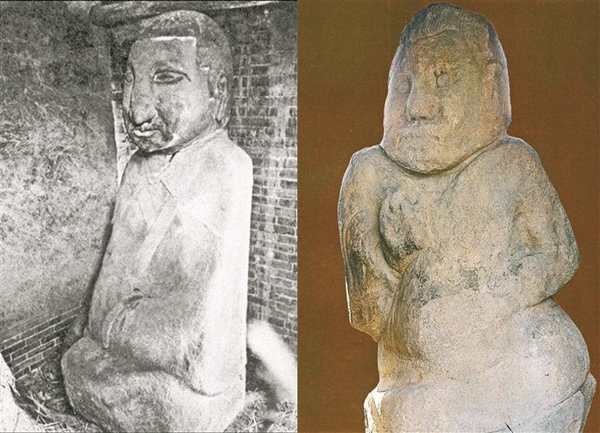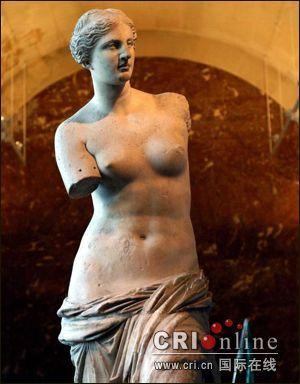


Statues of Zhi Nu (left) and Niu Lang
The official statues of Zhi Nu and Niu Lang, heroes of the romantic legend behind China’s Qixi Festival, were commented as rough, wild, and eye-stinging by Weibo users especially when compared with graceful Greek statues. But analysts point out different climates contributed to the two different sculpture styles in ancient China and ancient Greek.
Qixi, Chinese Valentine’s Day, originates from a love story between a fairy and an orphan cowherd. The two statues unearthed in Xi’an were made in the Han Dynasty, over 2,000 years ago. Today, they are of historical importance as the first evidence of the romantic legend.
The Han sculptures seem far from romantic compared with the story. Some net users roasted the wild style of the two statues and even questioned the standard of beauty in the eyes of ancient China people.

Contemporary statues in ancient Greek, like the Venus de Milo, are more beautiful and aesthetic, argued some netizens.
However, historical records tell the truth. The elegant Venus, one of the three treasures in Louvre, was manually restored to its grace. When firstly discovered by a farmer near an island, the goddess was just a heap of pieces. What is now the graceful and renowned statue was joined with glues and marble powders.
Different climates contributed to the two different sculpture styles in ancient China and ancient Greek. With various dressing styles, ancient people in China and the West nurtured different aesthetic styles.
Ancient China excelled at scripture craft, which can be shown by many delicate relics, such as the Terra Cotta Warriors. It is therefore unfair to compare the two types of art out of their historical, cultural, and geographical contexts.
 Fire brigade in Shanghai holds group wedding
Fire brigade in Shanghai holds group wedding Tourists enjoy ice sculptures in Datan Town, north China
Tourists enjoy ice sculptures in Datan Town, north China Sunset scenery of Dayan Pagoda in Xi'an
Sunset scenery of Dayan Pagoda in Xi'an Tourists have fun at scenic spot in Nanlong Town, NW China
Tourists have fun at scenic spot in Nanlong Town, NW China Harbin attracts tourists by making best use of ice in winter
Harbin attracts tourists by making best use of ice in winter In pics: FIS Alpine Ski Women's World Cup Slalom
In pics: FIS Alpine Ski Women's World Cup Slalom Black-necked cranes rest at reservoir in Lhunzhub County, Lhasa
Black-necked cranes rest at reservoir in Lhunzhub County, Lhasa China's FAST telescope will be available to foreign scientists in April
China's FAST telescope will be available to foreign scientists in April "She power" plays indispensable role in poverty alleviation
"She power" plays indispensable role in poverty alleviation Top 10 world news events of People's Daily in 2020
Top 10 world news events of People's Daily in 2020 Top 10 China news events of People's Daily in 2020
Top 10 China news events of People's Daily in 2020 Top 10 media buzzwords of 2020
Top 10 media buzzwords of 2020 Year-ender:10 major tourism stories of 2020
Year-ender:10 major tourism stories of 2020 No interference in Venezuelan issues
No interference in Venezuelan issues
 Biz prepares for trade spat
Biz prepares for trade spat
 Broadcasting Continent
Broadcasting Continent Australia wins Chinese CEOs as US loses
Australia wins Chinese CEOs as US loses